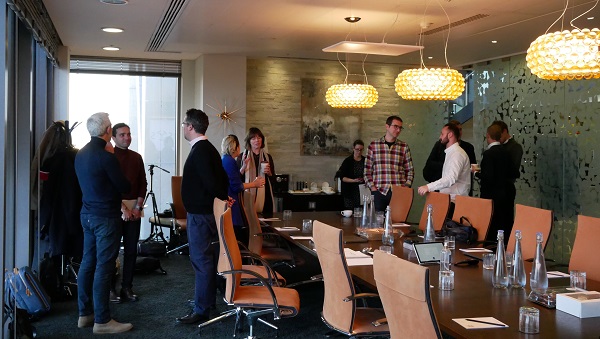ROUNDTABLE | Flight to quality: the real estate technology reckoning
Major European office players including LGIM, Axa, Landmark, TOG, Hines and Grosvenor, came together to debate the state of the flex market, Big Tech’s march into real estate and the impact of macro-economic headwinds at this special debate hosted by PlaceTech and essensys.
Full list of attendees:
- James Lowery, CEO, UK and Europe, essensys
- James Goldsmith, head of leasing, AXA IM
- Sally Jones, head of strategy, digital and technology, British Land
- Simon Abboud, European management services, Hines
- Kevin Kincaid, group technology director, Grosvenor
- Emma Swinnerton, partner, EMEA head of flexible leasing solutions, Cushman & Wakefield
- Ed Cowell, CEO, Landmark
- Sam Wilson, director of technology + digital solutions, Bruntwood
- Ruman Sahota, proptech analyst, LGIM
- Tim Peacock, head of data and digital transformation, Landsec
- Charlie Green, co-founder, The Office Group
- Chaired by Paul Unger, editor, PlaceTech
The world is changing, becoming more flexible, digital and sustainable.
Building technology has never been more important for the real estate industry as it works to address these changing dynamics. So, how can commercial buildings remain competitive by being more sustainable, adaptable and intrinsically connected?
Delivering a seamless digital experience is not easy and is becoming ever more complex. External factors such as shifting customer expectations, the energy crisis, extreme weather conditions mean more complexity for landlords, operators and property managers. How are developers and investors responding and can working together with tech partners help address these challenges facing real estate?
Summary of themes arising from the debate
Macro economic picture
SERVICE CHARGE | Some people are forecasting that service charges are going to double, making energy-efficient buildings more valuable and more attractive. Operational efficiency is more important than ever.
FLEX SUPPLY | As we have continued uncertainty in the market, there are good reasons why we might see more people looking at flexible workspace solutions as a solution. Landlords are going to put 10% to 20% of their portfolios into flex space. The absent landlord who does nothing in flex is not going to be here for long. If landlords don’t move quickly enough we will see a disconnect between supply and demand, and this becomes a problem for everyone.
RELATIONSHIPS | Relationships are hampered by the complexity of property, where a large corporate occupier can involve HR, finance, technology, sustainability in the office deal. Not many companies can pull all that together and have a coherent relationship with their landlord.
BUDGETS | “Every part of the budget has been scrutinised recently,” one developer explained. “Much harder than ever before. And we have to be able to justify everything that we spend on tech, I think it’s much easier now we can prove we have some proper tools, which helps us to drive operational efficiencies.”

Pain points
COMPLEXITY | There are so many office tenant experience apps and some do different things and they don’t always talk to each other. Maybe the landlord wants a mix in the buildings and then occupiers do their own thing – it’s just going to explode. We need to get more of an open architecture where people can integrate these and where you’re not wedded to one provider, you can move around.
What happens to the tech in a building as we buy and sell buildings? There’s a lot of complexity, even with funds in the same parent group competing with one another if you’ve got different investors, different managing agents between the different funds.
COMMS | Corporate occupiers want better communication with landlords, on topics such as capex. Communication is currently limited and the two parties tend to meet at set times, typically at the end of the lease or when rent is due.
CONTRACTS | Relationships are governed by contracts. Now we’re talking about relationships that are governed by tech, because we’ve got this feedback data. How do we combine the two, as they follow different timescales?
NEED | Actual need for tech versus the vendor’s perceived need remains a common annoyance in dealing with proptech. The VC-backed proptech scene has also exploded in recent years but founders “do not have shared interests” with property, one speaker said, pointing to the short-term sales drive and growth metrics driving these startups in contrast to the patient handholding and slower evolution required by real estate’s boardroom culture. Can this tension be resolved?

How can tech help?
SCALABLE | Having tech that can scale to cover more than one building will help property companies and occupiers who want amenity as they move from one building to another.
SIMPLICITY | Several of the participants said they were having to build their own overarching layer of tech to integrate all the various apps their companies were using, because they didn’t talk to each other well enough. One was doing this in-house, another with an external partner. There is a gap in the market for a surface layer combining all applications allowing flexible plug-in, plug-out use.
CARBON EFFICIENCY | “Our executive team is paid to deliver on embodied carbon targets and operational carbon targets. I don’t think it’s going to go away. I think if anything, you’ll stop doing some other peripheral stuff, and you have really bear down on operational efficiency.
“One pet hate is how everything on new projects is being specified on what happened before. No one is thinking about what’s going to be happening in the future, what life could be like with extreme weather events becoming more frequent. The future is going to look really different. Climate is going to be absolutely massive in terms of how people assess buildings.”
COMMUNITY | Often occupiers in multi-let assets do not know each other. Connecting them, even via a simple Facebook group, can create opportunities for sharing business leads, available space, exchanging materials for reuse and much more.

Forecast
BIG TECH | Big tech is sniffing at the door. Apple Wallet is used by access control suppliers. Microsoft is spending a lot on real estate solutions. “They all want a slice of this asset class,” as one contributor put it.
SMART PREMIUM | As FM and utilities and design become more intelligent, a new service line for landlords could emerge that sells intelligent office space as a separate category. There could be demand for occupiers to have their space made intelligent with sustainable data made available, plugging them into relevant events and tracking their occupancy.
SKILLS | Tech is an enabler but unless people working in property can use tech properly, with a new set of skills, it will not reach its potential. Skills covering data competence, content creation, even behavioural psychology borrowed from other industries to understand how humans change their habits, are all required in the future of real estate.




